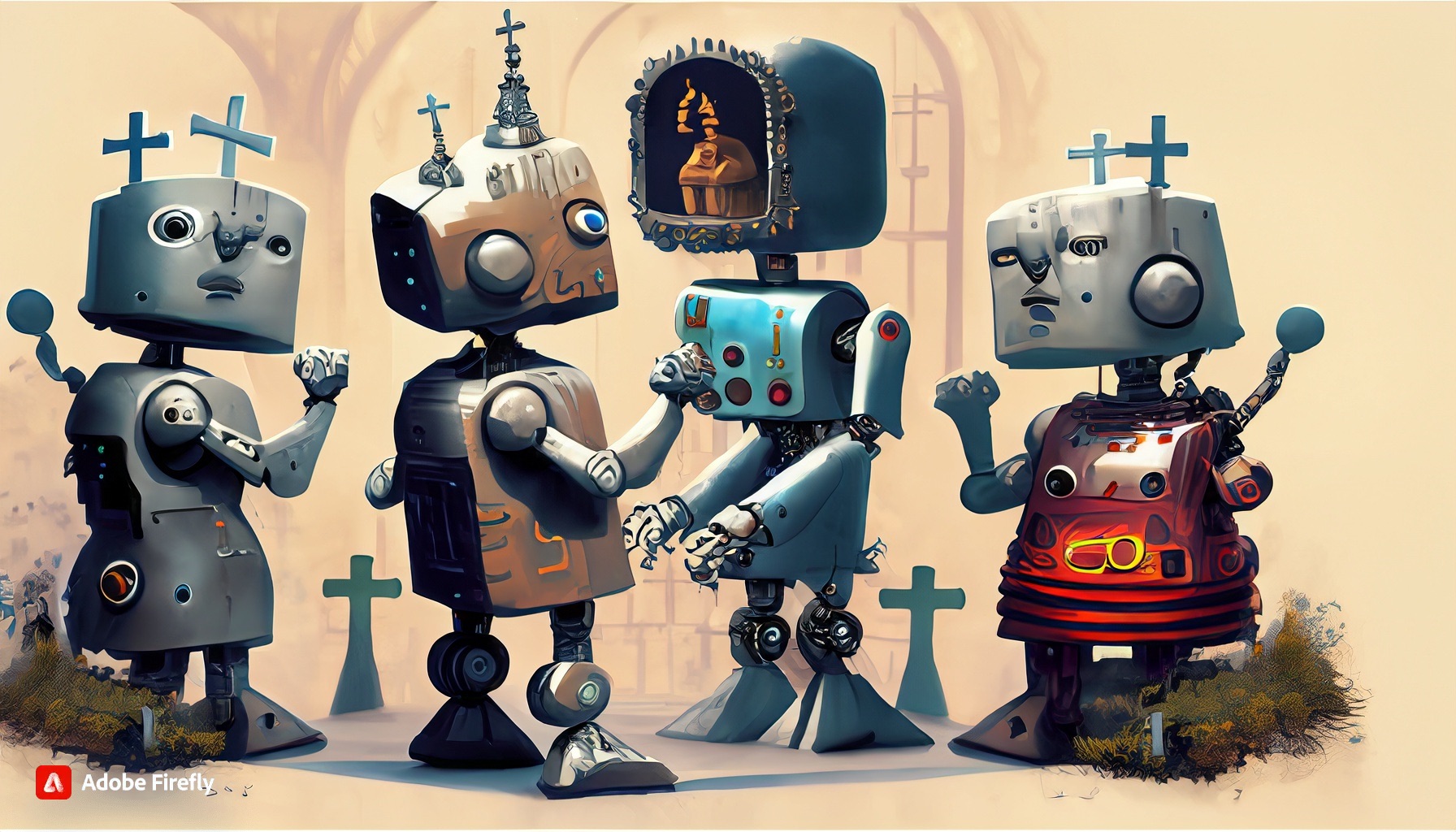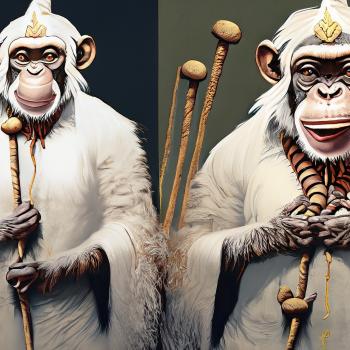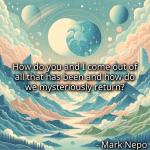
The Wager Everyone Makes
Every person alive makes a bet about how to live their life, specifically whether to believe in God and an existence beyond this one. Though, rather than being a single yes or no choice I think it’s best to think of there being four possible choices.
The first choice, and still the most common (though declining every year) is to identify with a religious ideology. There are various levels of religious belief and adherence, but currently 84% of people worldwide identify as a member of some religion. That might sound high, but it is down from the 99-100% of just 50 years ago. While the exact details of how existence is perpetuated beyond death varies from sect to sect, all of the people in this group believe in such an existence.
The second choice is the choice of the traditional atheist, Bertrand Russell described it thusly:
That Man is the product of causes which had no prevision of the end they were achieving; that his origin, his growth, his hopes and fears, his loves and his beliefs, are but the outcome of accidental collocations of atoms; that no fire, no heroism, no intensity of thought and feeling, can preserve an individual life beyond the grave; that all the labours of the ages, all the devotion, all the inspiration, all the noonday brightness of human genius, are destined to extinction in the vast death of the solar system, and that the whole temple of Man’s achievement must inevitably be buried beneath the débris of a universe in ruins — all these things, if not quite beyond dispute, are yet so nearly certain, that no philosophy which rejects them can hope to stand. Only within the scaffolding of these truths, only on the firm foundation of unyielding despair, can the soul’s habitation henceforth be safely built.
Russell’s case is both unambiguous and clear-eyed, if you’re going to reject religion and embrace atheism, then this is what you have to confront. Still, not every traditional atheist agrees with Russell’s point about “unyielding despair”. The well-known astronomer Carl Sagan and his wife Ann Druyan, both atheists, had a different take. As Ann described it:
We never trivialized the meaning of death by pretending it was anything other than a final parting. Every single moment that we were alive and we were together was miraculous-not miraculous in the sense of inexplicable or supernatural. We knew we were beneficiaries of chance. . . . That pure chance could be so generous and so kind. . . . That we could find each other, as Carl wrote so beautifully in Cosmos, you know, in the vastness of space and the immensity of time. . . . That we could be together for twenty years. That is something which sustains me and it’s much more meaningful…I don’t think I’ll ever see Carl again. But I saw him. We saw each other. We found each other in the cosmos, and that was wonderful.
Regardless of whether they view the world with despair or wonder, the traditional atheist acknowledges that death is unavoidable and nothing lies beyond it.
The third choice is the choice of apathy and inaction. This includes all the people who aren’t declared atheists (or agnostics) or transhumanists (who we’ll get to in a moment). It also includes people who identify with a religion, but other than attending church once to be baptized (or something similar) have never attended since.
Depending on exactly where you draw the line, this group could be the biggest of all, at least in America and Europe. I’m probably not the best person to talk about this group. Despite their numbers, they baffle me. I understand the appeal of dealing with what’s right in front of you. Of enjoying what you have without thinking too much about what does or doesn’t happen when you die, which is anyway decades away. But at some point you have to grapple with it, don’t you? Perhaps this is just a difference in levels of belief between the old and the young or to put it another way, those who are about to die and those who are a long way from death, though I don’t think it’s as simple as that.
The final choice is one that has only lately come on the scene, the choice of transhumanism. Most of these people are also atheists, but rather than reacting to the prospect of death with despair like Russell, or just being grateful for the extreme improbability of the life they did get, the transhumanists desire immortality without involving God.
I suppose you could argue that, were they to achieve immortality, they would not be entering into an existence separate from this one. Rather they are extending the existence we already have. This may be technically true, but as long as there has been life it has been paired with death. Creating an existence without death should surely count as something different, even if on the day to day level it looks very similar. Even then, this assumes that transhumanism takes the form of simple immortality and doesn’t involve things like transferring consciousness to one of Robin Hanson’s EMs, or something even more fantastically futuristic.
Betting on Religion
As someone who has made the first choice, I’m going to make a pitch for it. I believe there is a life after this one, but I also think that it’s the best choice even if we set aside the promise of potential salvation offered by most religions.
I’m going to take much of what I say from a talk given at the 2017 FAIRMormon Conference, by Dan Peterson, titled What Difference Does It Make? I’ve already stolen the Russell quote from the speech, and you should read Peterson’s talk in its entirety. Or, if you prefer, you can listen to it.
As I said everyone is making a choice between one of four options (or perhaps not choosing in the case of option three). Peterson makes the case that the first option is the best choice even without considering whether it leads to some sort of existence after this one. To begin with he argues that it improves a person’s health, particularly their mental health. The irony here is that so many people in the other groups actually make the opposite argument, that religion is something of a mental illness.
Peterson offers the following evidence:
Harold Koenig, a psychiatrist on the faculty of Duke University, has established himself as a premier authority in this area. He and his collaborators argue that religious involvement is correlated with better mental health in the areas of depression, substance abuse and suicide, and, somewhat less certainly, with better results in the treatment of stress-related disorders and dementia.
Moreover…Tyler VanderWeele, professor of epidemiology at Harvard University…confirms the links that previous scientific investigation had identified between attendance at religious services and enhanced health. Regular attendance is associated, for example, with “a roughly 30 percent reduction in mortality over 16 years of follow-up; a five-fold reduction in the likelihood of suicide; and a 30 percent reduction in the incidence of depression”…
Regular participation in communal religious worship [also] appears to be associated with “greater likelihood of healthy social relationships and stable marriages; an increased sense of meaning in life; higher life satisfaction; an expansion of one’s social network; and more charitable giving, volunteering, and civic engagement,” says VanderWeele.
One might perhaps conclude that it’s the social support afforded by religious participation that confers such benefits. VanderWeele, however, says that social support accounts for only about 20-30 percent of the measured results. The self-discipline encouraged by religious faith and the optimistic worldview that it supports also appear to be important contributing factors to physical health and longevity.
The “five-fold reduction in the likelihood of suicide” is particularly interesting. First, because the effect is so large. Second, because we’ve seen both a rise in teen suicides while at the same time seeing a reduction in teen religiosity. Third because Peterson opened his talk with a story of someone who committed suicide after leaving the Church. From all appearances because of his anger at the Church for its many perceived lies. To say that this particular individual would still be alive if he had never left the Church, is both callous and unwarranted. It’s impossible to say what would happen with any given individual, but if VanderWeele’s claims are to be believed, there are thousands of people who would be alive today if they had been active in a religion.
Peterson goes on to quote Dr. Andrew Sims, former president of the United Kingdom’s Royal College of Psychiatrists and professor of psychiatry at the University of Leeds:
The advantageous effect of religious belief and spirituality on mental and physical health is one of the best-kept secrets in psychiatry, and medicine generally…If the findings of the huge volume of research on this topic had gone in the opposite direction and it had been found that religion damages your mental health, it would have been front-page news in every newspaper in the land! Churches are almost the only element in society to have offered considerate, caring, long-lasting and self-sacrificing support to the mentally ill… [which is one of the reasons why] religious involvement results in a better outcome from a range of illnesses, both mental and physical.
There is much that could be said about these claims, and I’m sure that many people would quibble over this or that aspect of the studies. This is not the place for a comprehensive examination of the evidence. I find the reaction of the public at large more interesting. Sims has a point that if the research (a “huge volume” recall) had gone in the opposite direction it would have been front-page news. Publish one study showing the beneficial effects of chocolate and its front page news. Publish a hundred studies on the benefits of religion, and you have to trawl obscure blogs in order to hear about it.
In fact it’s my sense that such research is becoming rarer. Possibly this is because the conclusions are solid enough to not require further support. More likely it’s because in this day and age no one wants to engage in the study of religion at all, particularly if that study is going to force them to arrive at a conclusion they don’t like. If you still have your doubts Peterson goes on to further summarize Sims’ findings:
In the majority of scientific studies…religious involvement correlates with enhanced well-being, happiness and life-satisfaction; greater hope and optimism, even when facing serious diseases, such as breast cancer; a stronger sense of purpose and meaning in life; higher self-esteem; better responses to bereavement; greater social support; less loneliness; lower rates of depression and faster recovery from depression; reduced rates of suicide; decreased anxiety; better coping with stress; less psychosis and fewer psychotic tendencies; lower rates of alcohol and drug abuse; less delinquency and criminal activity; and greater marital stability and satisfaction.
Indeed, correlations between religious faith and improved well-being “typically equal or exceed correlations between well-being and other psychosocial variables, such as social support.” And, he adds, this substantial assertion is “comprehensively attested to by a large amount of evidence.”
“The nagging question we are left with is, why is this important information” — “epidemiological medicine’s best-kept secret,” [Sims] calls it — “not better known?”
“If it were anything other than religious belief or spirituality resulting in such beneficial outcomes for health, the media would trumpet it and governments and health care organizations would be rushing to implement its practice.”
Here I diverge somewhat from Sims and Peterson, I don’t know that health care organizations and governments could successfully duplicate the positive benefits of religion. In particular, it doesn’t seem that forcing someone to join a religion probably gives the same benefits as someone voluntarily joining a religion, or staying in the religion of their parents.
Where Should You Place Your Bet?
With all the discussion of wagering, some of you may naturally be thinking of Pascal’s Wager. Me too, but that’s a big enough topic that it really needs its own post. So that’s what I’ll tackle next week. For now, given what I just said, what would I recommend? I’m not sure I have a strong recommendation for those who have made choice two, the atheists. I don’t think there’s any benefit to faking religious observance. Though I will say that faking is closer to trying than most people realize.
For the apathetic, I would offer the general observation that apathy is unproductive in general. Beyond that I would urge you to look into the religion of your ancestors. Perhaps there’s more going on there than you realized.
But as this is a blog about the intersection of technology and religion, I would like to discuss the transhumanist choice. While Peterson did an excellent job of covering choices one, two, and three he understandably didn’t spend any time talking about transhumanism. This is one area where I might be able to add to the discussion.
To begin with, one of the advantages of religion is that it seems to work even for the very poorest and most disadvantaged people. In fact, it may be that among those people is precisely where it’s the most useful, particularly when compared with other “interventions.” In contrast, the transhumanist ideology is almost entirely restricted to affluent first-worlders with a predilection for technology.
If we consider the route to “salvation” provided by transhumanism on its own it has the advantage of potentially providing immortality and eternal happiness even if there should turn out to be no God, this is counterbalanced by the disadvantage I already mentioned of, at least initially, only being available to a select few. Also it’s unclear if the transhumanist ideology would create any of the advantages I mentioned above as far as mental and physical health. Unless we assume that all the benefits of religion come because of its promised immortality, which I strongly doubt, transhumanism is unlikely to act as a substitute.
Still the transhumanist option is fascinating. I think they’ve made the wrong choice, but if you start with the assumption that all religions are false, this is probably the best course of action one could choose. That said, I think they overstate the advantages—immortality is going to be ridiculously difficult, and yet it’s child’s play compared to ensuring eternal happiness—and understate the disadvantages.
To conclude, let’s for the moment imagine that being an atheist or a transhumanist is a good thing, that somehow it replaces all of the benefits of religion with something as good or better. I very much doubt this is the case, but for the sake of argument let’s assume that it is. We still have the problem that the vast majority of people have not left religion for atheism and transhumanism. The vast majority of people have left religion for nothing. Thus we have not replaced believers, with all the benefits attached, with intellectually courageous atheists, or futuristic transhumanists, but with a vast and increasing mass of shallow, materialistic, status seeking people who have lost the benefits of religion without any accompanying compensation.












